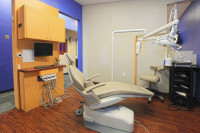Sleep Apnea May Affect Memory of Everyday Events, Studies Show
Is Temporomandibular Joint Disorder (TMJ) Genetic? Clues From New Research
June 29, 2016Sleep Apnea and Its Relationship to Snoring
July 13, 2016Sleep Apnea is a sleeping disorder that affects millions of Americans. Many cases of sleep apnea go undiagnosed or

Hilliard Cosmetic dentist Mark Levy, D.D.S. specializes in a wide range of cosmetic dentistry techniques. At his practice, located in Hilliard, near Columbus, Ohio, Dr. Levy provides an array of cosmetic dentistry procedures, such as Americas-best-dentist porcelain veneers, headache therapy, sleep apnea, dental implants and more.
Mark Levy DDS
1925 Hilliard Rome Rd
Hilliard, OH 43026
https://marklevydds.com
untreated because the lifetime effects of the disorder have been played down until recent studies have shown just how dangerous it can be.
Studies have now shown that sleep apnea affects your body in unexpected ways, influencing the health of your heart, body, and even your brain. In fact, a recent study piloted by researchers at NYU Langone Medical Center has concluded that sleep apnea can also affect your memory of everyday events.
Sleep Apnea Study Uses Video Games to Test Memory Function
The study, published in the Journal of Neuroscience, has shown that when rapid eye movement sleep, or REM sleep, is disturbed as a consequence of sleep apnea episodes that it impairs spatial memory. This means that your sleep apnea May significantly affect your ability to create new spatial memories, including the location of your parked car or where you set your keys.
Spatial memory is something that people rely on for everyday tasks. It helps them to remember the locations of businesses, how to find your way home, or where you left certain items at home. This is a type of memory that is also affected by Alzheimer disease which can result in people affected by Alzheimer’s to wander away.
The study was conducted by the clinical instructor of Medicine in the Division of Pulmonary, Critical Care and Sleep Medicine at NYU Langone, Andrew Varga MD, PhD. The attending physician in NYU’s Sleep Disorders Center assisted with the study as well. Previous, similar studies on rats have shown how damaging the effects of being deprived of REM sleep can be, however this was the first significant study for humans to document the negative consequences of sleep apnea on their spatial memory.
The sleep apnea study provided findings that the formation of specific memories can be impacted by the increasingly common sleep disorder. Even when other phases of sleep are uninterrupted and the sleep apnea is limited to only REM sleep, participants were showing negative effects. This shows that memory loss can be another symptom used to screen patients for sleep apnea.
Interruptions in REM Sleep and Sleep Apnea
Sleep apnea can occur at any time that the person suffering from the disorder is asleep, however it presents itself most severely during REM sleep. This is caused by more relaxed muscles in the upper airway that occurs during REM sleep.
A total of 18 subjects were brought into the study. Each of them suffered from severe sleep apnea and was treated with the use of a continuous positive airway pressure machine, or CPAP machine. The subjects were given baseline examinations using video games before the evaluation of their sleep patterns prior to their two-night visit at the NYU Sleep Disorders Center’s sleep lab.
The subjects played the video game before and after they slept. Using a joystick, they were to navigate through a computer generated, unique, 3D spatial maze. For one night of the study, the subjects used their CPAP machines just as they would at home, however on the other night the CPAP machine use was reduced during their REM sleep cycles to allow the sleep apnea to occur, while remaining at a therapeutic level during the other stages of sleep. This limited the sleep apnea episodes to only the REM sleep cycle.
During the night that they used their CPAP machines all night as directed, the study observed that the subjects had a 30% improvement in the time it took them to complete the maze from their initial tests. However, the test results from the other night where their REM sleep cycle was disrupted they took about 4% longer than their baseline testing to complete the maze. Not only was there not improvement from the baseline, but they actually did worse.
In order to ensure that the delayed response time wasn’t due to being more tired, the subjects also were tested with a psychomotor vigilance test to measure attention. They did not experience delayed reaction times during this second test which indicates that sleepiness or lack of attention were not contributing causes the decline in the formation of spatial memory.
What This Study Means for Sleep Apnea Sufferers
Approximately one fourth of middle-aged men suffer from sleep apnea. Not only can this disorder cause the blood oxygen levels to repeatedly drop, but it also causes the person suffering from the disorder to wake several times per night, often without their knowledge. Both of these sleep apnea symptoms can greatly influence your body and mind, especially if you don’t seek out treatment for the disorder.
It’s extremely important that you speak with your doctor in the event that you exhibit the symptoms of sleep apnea so that you can be evaluated sooner rather than later. Early intervention is key in preventing long term, permanent effects of sleep apnea. By diagnosing the disorder early, you can begin finding the treatment plan that is most effective for your case of sleep apnea.
